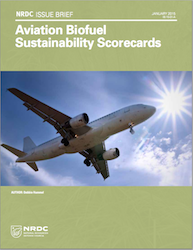The Natural Resources Defense Council (NRDC) has launched a first-of-its-kind scorecard that rates airlines’ use of integrating sustainable biofuels into their fleets. Air travel emits more than 650 million metric tons of carbon pollution each year – nearly the amount emitted of 136 million cars. The leader of the pack is Air France/KLM.
“It’s great to see certain airlines becoming leaders in the use of sustainable biofuels,” said Debbie Hammel, senior resource specialist with NRDC’s Land & Wildlife Program and author of the scor ecard. “As the world rises to the challenge of curbing climate change and cutting carbon pollution, addressing air travel pollution has to be part of the mix. The aviation sector has been pretty proactive about this issue, and an industry-wide increase in the use of sustainably produced biofuels is definitely on the horizon.”
ecard. “As the world rises to the challenge of curbing climate change and cutting carbon pollution, addressing air travel pollution has to be part of the mix. The aviation sector has been pretty proactive about this issue, and an industry-wide increase in the use of sustainably produced biofuels is definitely on the horizon.”
NRDC’s Aviation Biofuel Sustainability Scorecards evaluated airlines’ adoption of biofuels, focusing on the use of leading sustainability certification standards, participation in industry initiatives to promote sustainability certification, public commitments to sustainability certification in sourcing, and the monitoring and disclosure of important sustainability metrics. The leading sustainable carrier is Air France-KLM, followed by British Airways, United Airlines, Virgin Atlantic, Cathay Pacific and Alaska Airlines.
NRDC has found that the airline industry has made great strides in recent years. During the past five years, 40 commercial airlines around the world have flown nearly 600,000 miles powered by biofuels. Low-carbon fuels will play a key role in the industry’s efforts to hold its carbon emissions steady after 2020 and cut net carbon emissions to half of the 2005 level by 2050 according to NRDC. To meet these goals, a new market has emerged to provide biofuels for the aviation sector. But, said NRDC, the adoption of credible, third-party sustainability certification systems are necessary to ensure that the emerging aviation biofuels market is providing fuels that are sourced sustainably.
The scorecard and issue brief encourages airlines to send clear market signals notifying suppliers of the importance of sustainability certification – ideally using the certification framework created by the Roundtable on Sustainable Biomaterials (RSB) – and make a public commitment to source 100 percent certified-sustainable biofuels.
“How airlines move forward is still up in the air,” Hammel added. “While some in the industry have made real progress in implementing sustainability commitments this past year, there’s more to do. The industry must commit to robust standards for sourcing these fuels to ensure that they’re truly sustainable in the long-term.”

